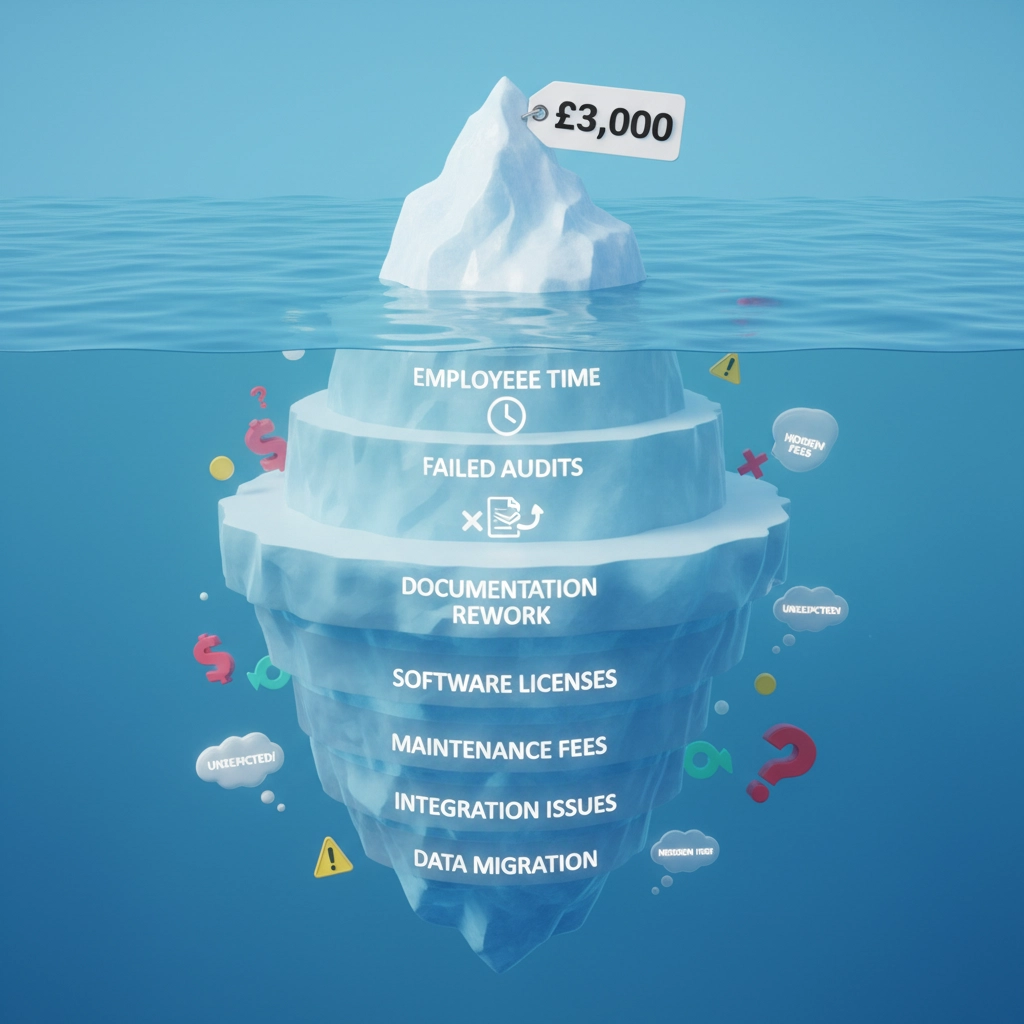
DIY ISO Preparation vs Hiring a Consultant: The Real Costs Revealed (2025 Update)
0
0
0
Are you staring at ISO certification requirements wondering whether to tackle them yourself or bring in professional help? You're not alone. Every year, thousands of business owners face this exact dilemma, and the decision you make could save or cost your company tens of thousands of pounds.
The truth is, the upfront price tag tells only half the story. While DIY ISO preparation might seem like the budget-friendly option at £3,000 [6], and hiring consultants appears expensive at £5,700-£50,000 [1][3][4][9][10], the real costs, including your time, potential failures, and hidden expenses, paint a completely different picture.
Let's dive deep into what you're really signing up for with each approach, so you can make the decision that truly serves your business.
The Real Cost Breakdown: What Nobody Tells You

DIY Route: The £3,000 That Becomes Much More
When you choose to handle ISO preparation internally, that attractive £3,000 [6] price tag covers basic materials, templates, and perhaps some online training. But here's what it doesn't include:
Your Team's Time Investment: Preparing for ISO certification isn't a weekend project. Your staff will spend hundreds of hours learning standards, creating documentation, and preparing for audits. If you're paying key employees £50-100 per hour, you're looking at an additional £15,000-£30,000 in opportunity costs. [2]
The Learning Curve Tax: Without prior experience, your team will make mistakes, expensive ones. Research shows that 33% of DIY ISO implementations fail completely, requiring you to start over or bring in consultants anyway. [2][7][8] That's your initial investment down the drain, plus the cost of delays.
Re-audit Fees: Failed audits aren't just embarrassing; they're costly. Each additional audit attempt can cost £8,000-£15,000 [4][9][10], and you'll still need to fix the underlying problems that caused the failure.
Professional Consultant Route: Investment That Pays for Itself
Yes, hiring consultants costs more upfront: typically £5,700-£15,000 for ISO 9001 [1][3], or up to £50,000 for complex ISO 27001 implementations [4][9][10]. But consider what you're actually buying:
Guaranteed Expertise: Consultants bring years of experience and proven methodologies. They know exactly what auditors look for and how to prepare your organization accordingly.
Time Efficiency: What might take your team 6-12 months to figure out, consultants can guide you through in 3-6 months, getting you certified faster and reducing internal disruption [1][3][6].
Higher Success Rates: Professional guidance dramatically reduces the risk of failed audits, saving you from costly re-attempts and delays.
Hidden Costs That Catch Everyone Off Guard

The Documentation Nightmare
Creating ISO-compliant documentation from scratch is like building a house without blueprints. You'll spend countless hours writing policies and procedures, only to discover during your audit that they don't meet requirements. Professional templates and guidance prevent this costly rework.
Training and Competency Gaps
ISO standards require evidence of staff competency. Training costs range from £30-£400 per employee [3], but more importantly, you need to ensure the training actually prepares your team for audit questions. Inadequate preparation here leads to audit failures.
Internal Audit Requirements
Before external certification, you'll need internal audits. Professional internal audits cost around £7,500 [4][9], while training your staff to conduct them properly requires significant time investment and carries the risk of missing critical non-conformances.
When DIY Makes Sense (And When It Doesn't)
Choose DIY If You Have:
Small, straightforward operations with simple processes
Available internal expertise or staff with previous ISO experience
Plenty of time to dedicate to learning and implementation
Strong project management capabilities within your team
Budget constraints that make consultant fees genuinely prohibitive
Choose Consultants If You Have:
Complex, multi-site operations requiring sophisticated documentation
Tight deadlines for certification
Limited internal resources to dedicate to ISO preparation
Previous failed attempts at certification
Multiple standards to implement simultaneously
Critical business relationships dependent on certification
Your Step-by-Step Decision Framework

Step 1: Calculate Your True Internal Costs
Don't just look at the £3,000 DIY price tag. Calculate the real cost by considering:
Hours your team will spend (multiply by their hourly rates)
Potential delays to other projects
Risk of failed audits and re-attempts
Opportunity costs of staff time
Step 2: Assess Your Internal Capabilities
Honestly evaluate whether your team has:
Previous audit experience
Strong project management skills
Detailed understanding of your chosen ISO standard
Time to dedicate without compromising other responsibilities
Step 3: Consider Your Risk Tolerance
Ask yourself: Can your business afford a failed audit? What would a 6-month delay in certification cost you? Sometimes the "expensive" option is actually the safer investment.
Step 4: Explore Hybrid Options
You don't have to choose all-or-nothing. Consider hiring consultants for:
Initial gap analysis and roadmap creation
Documentation review and audit preparation
Mock audits to test your readiness
Specific technical areas where you lack expertise
The Hybrid Approach: Best of Both Worlds
Many successful organizations blend DIY efforts with strategic consultant support. You might handle routine documentation internally while bringing in experts for gap analysis, audit preparation, and technical guidance.
This approach typically costs £8,000-£15,000 [6][8]: more than pure DIY but significantly less than full consulting support. You build internal capability while benefiting from professional expertise where it matters most.
Making Your Decision: Questions to Ask Yourself
Before you commit to either approach, answer these critical questions:
How much is certification delay costing your business opportunities?
What's the real cost of diverting your team's focus from core business activities?
Can you afford a failed audit, both financially and reputationally?
Do you have someone who can dedicate significant time to managing this project?
Are there specific technical areas where you genuinely need expert guidance?
The Bottom Line: Value Over Price

The cheapest option isn't always the most cost-effective. While DIY preparation might save money upfront, consultant-guided implementations typically achieve certification faster, with higher success rates, and less internal disruption.
Your decision should be based on your organization's specific circumstances, capabilities, and risk tolerance. Small businesses with simple operations and available internal resources can successfully pursue DIY certification. Larger, more complex organizations usually find that consultant fees pay for themselves through reduced risk and faster implementation.
Remember, ISO certification isn't just about passing an audit: it's about building systems that improve your business operations for years to come. The approach you choose should align with your long-term business strategy, not just your immediate budget constraints.
Ready to make an informed decision about your ISO certification journey? Whether you're leaning toward DIY preparation or professional guidance, the key is starting with a clear understanding of what you're truly committing to. Don't let the fear of upfront costs prevent you from choosing the approach that will serve your business best in the long run.
If you're still weighing your options, consider starting with a professional gap analysis to understand exactly what you're facing. Sometimes the best investment is simply knowing where you stand before you begin.

![[HERO] The Golden Ticket: How ISO 9001 Gives SMEs a Massive Competitive Edge](https://cdn.marblism.com/uPt4zGG3thO.webp)
![[HERO] Modern Quality: The Final Verdict on ISO 9001 for Today](https://cdn.marblism.com/vCHFmRN88Yb.webp)
![[HERO] Counting the Cost: What Does ISO 9001 Actually Cost an SME?](https://cdn.marblism.com/ds1Nz_9uzoX.webp)